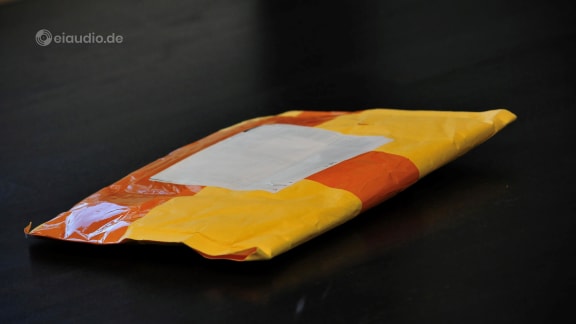Audiocrast OCC and Silver
15/02/2021
Author: Karsten Hein
Category: Gear & Review
Tag(s): Cables
Is it generally a good idea to buy audio cables for our HiFi system from cut-price vendors in China? The answer is: no.—Is it a good idea to buy this particular audio cable from China? The answer is: you bet! There are exceptions to every rule, as we shall see. The problem is that we can never be certain, whether the item we are looking at is the rare and exciting exception, or just another recapitulation of the boring old rule.
From the very first paragraph of writing about this interconnect, I can already feel the sad downside to cheap Chinese imports: The ever-present lack of credibility, certainty, and responsibility towards the customer. As some market observers will know, the cable shown here is sold on eBay. This particular variant is from a Chinese vendor by the name of ’audiophileseller’. But is this even a proper shop, or just a makeshift eBay address, hastily set up to sell off products that have fallen off the back of a truck? And who—or what—does the term ‘audiophile’ in the seller’s name refer to? The shop? The products sold? Or does it merely describe the ambition of the seller, as the name suggests? These are important questions, for those wanting to estimate the risk involved in purchasing from an unknown vendor in far-away China. The few ratings from international buyers rarely help in obtaining a clear picture.
To make matters worse, similar-looking cables can almost always be found from other Internet vendors, often for even lower prices. And, consequently, down the rabbit hole we go: Are these the same products? Are they better or worse? And—finally—are any of these items actually made out of the materials that they are claimed to be? In other words, how many buyers are going to have them delivered, take them apart, run a materials test, and publicly report on them, if their incentive was nothing more than the petty impulse of wanting to save a few bucks? By nature, tests of this kind are rare. And when they do occur, there is still the worry about consistency in the quality of manufacturing. Can we trust the craftsmanship to always be on the same level? Or do products made of similar components differ, simply due to changes in the quality of manufacturing?
In our western mode of doing business, branding helps us to give a product a finished form and character, and—paired with a contact address in case of trouble—a sense of legitimacy. The Chinese brand-free culture sees no other obligation, than to present the most attractive bling at the most approachable price, right at the point of sale. Much like a street vendor. After all, the “30-day test-and-return policy” is little more than a joke. If we consider that many cables have run-in times of more than 30 days, the only thing we can say for sure within this period, is that the product has arrived. And at times, I have even found that the sellers have meanwhile closed shop and are no longer able or willing to accept returns. For these very reasons, I have spent quite a sum of money in hunting for cables that fall short of the term ‘audiophile’ over the years.
Ultimately, this leads us back to the initial question. Is it a good idea to pruchase cables directly from China? Well, I am surprisingly relieved to find that the particular cinch/RCA interconnect that is presented here is a welcome exception to the norm. The plugs really are from the Chinese HiFi-brand Audiocrast, and, from what I could hear in my listening tests, I am also willing to believe that they are of solid copper and plated with 24k gold, just as described. In fact, the plugs are so heavy and slide on so well that they are a genuine highlight in themselves. The cables are described to be of OCC copper with an 8N silver coating. This, too, I can believe.
After all, there is something incredibly satisfying about stumbling upon a great cable. It is usually not any one particular thing that it does well, but rather the sum of its characteristics that comes together in what can only be described as—music. Now, this appears to be an easy enough conclusion to reach, you might think, because all cables connecting audio components cannot help but play the music that is fed through them. Sadly, this is only partially true, because, more often than not, a significant amount of the content of the original music is lost in terms of speed, dimension, dynamics, and tonality. The accumulated loss accounts for the phenomenon that people listening to your system play from another room will not think you have invited the musicians to play for you. The better our system is, the harder this distinction becomes.
The Audiocrast OCC and silver cable, sold by a Chinese eBay vendor, with its golden cinch/RCA plugs, braided design with Teflon dielectric, silver-plated OOC copper wires, and its non-branded manufacturer in who-knows-where, pulls of a magic act to rival well-known manufacturers, such as Kimber, Fadel Art, etc. Perhaps it is just a lucky shot, but the combination of materials works great, with the OCC copper-core providing tonal harmony and the silver-coating maintaining speed. If your system has music inside it, this interconnect will help you bring it to the surface. Never mind that of the three cables I ordered over a period of 4 months, not two actually look the same: two cables have direction indicators that are missing on the third. And one of the two cables with indicators sets itself apart from the rest by having the red and black colour-coating of the plugs confused.
Specifications
- Cable lengths: 100cm
- Material: OCC copper, silver-coated
- Plugs: Audiocrast, gold-plated
- Electrical characteristics: N.N.
- Handling: soft, thin, bouncy (difficult to place)
- Termination: gold-plated, Teflon insulator
- Position tested: CD player to preamplifier
Note: I did ask the ‘audiophileseller’ eBay shop for specifications on the cable (with plugs or without). The response was that they only knew it was made of OCC copper and silver, terminated with gold plated Audiocrast plugs. Well, I expected no less.




